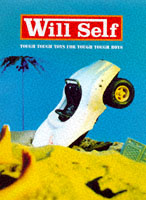Robert Clarke
In his new collection of short stories, Will Self once more welcomes us to the terrifyingly trenchant world of the literary recusant. With his usual irreverent wit and unrestrained surrealism, Tough Tough Toys For Tough Tough Boys sees Self move from the ridiculous to the downright absurd through a mixture of high art and low life, leaving in his wake a darkly satirical collage of contemporary fiction.
The opening story is a case in point. A pastiche of F. Scott Fitzgerald’s satirical fantasy on the power of money, ‘The Rock Of Crack As Big As The Ritz’ shows Danny, a former Yardie, finding a seam of crack cocaine running beneath his north London home. Self then takes us into a post-modernist underworld where the lust for the ‘sumptuary and sensual proclivities’ afforded by pin-striped merchant bankers and irreligious Iranians only ends in the book’s concluding story ‘The Nonce Prize’, which sees Danny’s wrongful imprisonment for the murder of a child and his redemption as an aspiring author.
Both stories, part of a trilogy with Self’s earlier novella ‘The Sweet Smell of Psychosis’, offer a strangely nonsensical and at times a frankly disturbing insight into the criminal milieu of drug pushers, prostitutes and pederasts. His vision is saved from accusations of bad taste by virtue of his ability to tally the abstruse with the abstract without subtracting from an underlying sense of his own moral responsibility. Indeed, Self portrays what he sees as the contemporary mal du siécle , albeit with a profound sense of his own authorial impunity and comic sophisticality.
‘Flytopia’, for example, is a pestilential domestic horror in which the hero wakes up to find his house run by socially conversant insects. In ‘Dave Too’, Self examines the nature of identity and anxiety within an ultramonistic world inhabited solely by people named Dave. ‘A Story for Europe’ is another typically absurd piece of meta-psychosis where a German banker suffers a stroke that leaves him a gibbering wreck while Humphy, a rather precocious child of two, develops a gift for speaking business German.

What links the stories together is Self’s own fear of what he sees as the repression of individuality the of the modern where people feel peripheral even to themselves. The ideas are sometimes weakened by the absence of character and plot, a problem that Self readily admits, Indeed, the problem is exacerbated, as in some of his earlier work, by their method of structure, the centring of his prose around a joke, an extended gag which at times fails to carry the ideas that lay behind it let alone raise a smile. In ‘Caring, Sharing’, tiny neurotic adults are pandered to by giant sexually active children, as Self attempts to satirise what he sees as the fetishisation of childhood and the confusion of generations by the effects of liberal parenting. The interplay of symbol and reality lacks sufficient substance to provide the foundation for effective satire, and to be able to suspend disbelief long enough before thinking ‘what’s the point?’ rather than ‘What is in an id?’
However, when Self gets it right, and exploits his talent for combining the preposterous and the personal, he produces some of his most provocative and at times poignant fiction to date. The book’s title story is a picaresque road movie that leaves the familiar grey area of London when the baldly figured character of Bill Bywater experiences a lack of engagement with the reality of the outside world. Slowly absorbed into the body of his car in an existential drama that leads him finally to turn into a non-existent lay-by, he is then resurrected in the contrastingly prequencial ‘Design Faults in the Volvo 760 Turbo: A Manual.’ In a further inspired piece of intertextuality, Self creates a paranoid vision of the urban adulator based on Freud’s theory that ‘everyone hides the truth in matters of sex,’ as Bill’s obsession with the doll like figure of his mistress and subsequent guilt is writ large across the child-like libido of the male psyche.
This provides the central theme and creative dynamics of the book itself as Will Self continues to toy with our imaginations, playing with different modes of narrative perspective and thematic ideation. Tough Tough Toys For Tough Tough Boys is a collection of stories which far from being simply frivolous, offers a seriously unconventional view of life in an age when apparently only the most earnestly self- admissive of writers are viewed with importance. Indeed, if “life is a dream which keeps us from sleeping”, as Self quotes Oscar Wilde in the book’s epigram, then this book will keep you awake for hours.
